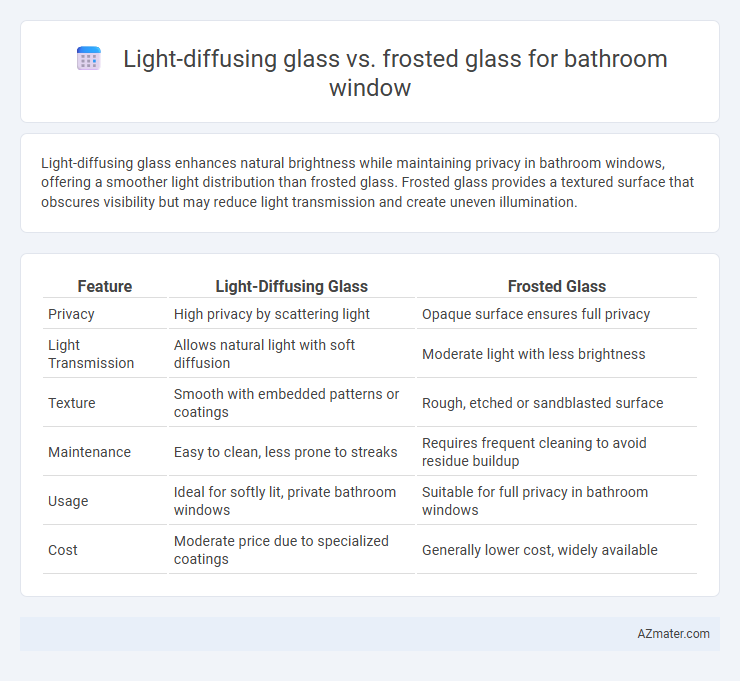Light-diffusing glass enhances natural brightness while maintaining privacy in bathroom windows, offering a smoother light distribution than frosted glass. Frosted glass provides a textured surface that obscures visibility but may reduce light transmission and create uneven illumination.
Table of Comparison
| Feature | Light-Diffusing Glass | Frosted Glass |
|---|---|---|
| Privacy | High privacy by scattering light | Opaque surface ensures full privacy |
| Light Transmission | Allows natural light with soft diffusion | Moderate light with less brightness |
| Texture | Smooth with embedded patterns or coatings | Rough, etched or sandblasted surface |
| Maintenance | Easy to clean, less prone to streaks | Requires frequent cleaning to avoid residue buildup |
| Usage | Ideal for softly lit, private bathroom windows | Suitable for full privacy in bathroom windows |
| Cost | Moderate price due to specialized coatings | Generally lower cost, widely available |
Introduction to Bathroom Window Privacy Solutions
Light-diffusing glass provides enhanced privacy by scattering incoming light to blur visibility while maintaining natural brightness, making it ideal for bathroom windows. Frosted glass offers a more opaque surface with etched or sandblasted textures that effectively block clear views while allowing diffused light to enter the space. Both options optimize bathroom privacy by balancing light transmission and visual obscurity, catering to different aesthetic preferences and levels of privacy requirements.
What is Light-Diffusing Glass?
Light-diffusing glass is designed to scatter incoming light evenly, creating a soft, natural illumination while preserving privacy in bathroom windows. Unlike frosted glass, which has a textured or etched surface that obscures visibility directly, light-diffusing glass utilizes internal microstructures or layers to disperse light without compromising clarity or brightness. This type of glass enhances ambient lighting, reduces glare, and ensures a well-lit, comfortable bathroom environment.
Understanding Frosted Glass Technology
Frosted glass technology relies on acid etching or sandblasting to create a textured surface that scatters light, providing privacy while allowing natural illumination in bathroom windows. Unlike light-diffusing glass, which may use embedded particles or films to diffuse light uniformly, frosted glass offers a durable, permanent finish resistant to scratches and moisture, ideal for humid bathroom environments. This technology ensures privacy without compromising brightness, making frosted glass a popular choice for bathroom window applications.
Key Visual Differences: Light-Diffusing vs Frosted Glass
Light-diffusing glass scatters natural light uniformly, creating a soft, even glow that maintains privacy while maximizing brightness in bathroom windows. Frosted glass features a textured surface that obscures visibility by blurring images, providing strong privacy but allowing less light transmission compared to light-diffusing glass. For bathrooms, light-diffusing glass delivers optimal illumination with subtle privacy, whereas frosted glass offers a more opaque barrier, resulting in a dimmer ambiance.
Privacy Levels: Which Glass Offers Better Obscurity?
Light-diffusing glass offers superior privacy for bathroom windows by scattering incoming light, obscuring shapes without sacrificing natural brightness. Frosted glass provides moderate obscurity by creating a translucent surface that blurs visibility but may still reveal vague shadows. For optimal privacy levels, light-diffusing glass generally exceeds frosted glass in preventing clear views while maintaining ambient light.
Natural Light Transmission: Which Performs Better?
Light-diffusing glass offers superior natural light transmission by scattering sunlight evenly throughout the bathroom while maintaining privacy, allowing more daylight to penetrate compared to frosted glass. Frosted glass reduces glare by obscuring visuals but tends to block a higher percentage of light, resulting in a dimmer interior. For maximizing natural light without sacrificing privacy, light-diffusing glass generally outperforms frosted glass in bathroom window applications.
Energy Efficiency and Insulation Comparison
Light-diffusing glass enhances natural light penetration while reducing glare, providing improved energy efficiency by minimizing the need for artificial lighting during the day. Frosted glass offers superior privacy and moderate insulation properties but generally has lower thermal performance compared to specialized light-diffusing glass. When comparing energy efficiency and insulation, light-diffusing glass typically delivers better thermal regulation and daylight management, reducing heating and cooling costs in bathroom windows.
Maintenance and Cleaning Considerations
Light-diffusing glass typically features a smooth surface that resists dirt and is easier to clean using standard glass cleaners, reducing buildup from soap scum and moisture common in bathrooms. Frosted glass has a textured surface that can trap dust, grime, and soap residue, requiring more frequent and careful maintenance to prevent dullness or staining. Both types benefit from regular cleaning to maintain clarity, but light-diffusing glass generally demands less intensive upkeep over time.
Aesthetic Choices: Matching Glass with Bathroom Decor
Light-diffusing glass offers a subtle glow that enhances modern and minimalist bathroom designs by softening natural light while preserving privacy. Frosted glass provides a more opaque, textured surface that complements traditional or rustic decor styles, adding a sense of warmth and depth to the space. Choosing between light-diffusing and frosted glass depends on the desired balance between light transmission and the bathroom's overall aesthetic theme.
Cost Comparison and Longevity
Light-diffusing glass for bathroom windows typically has a higher upfront cost compared to frosted glass due to advanced manufacturing techniques that enhance privacy while maximizing natural light. Frosted glass offers a more budget-friendly option with adequate privacy but may show wear or etching over time, reducing clarity and aesthetic appeal. In terms of longevity, light-diffusing glass generally maintains its appearance longer because of its durable surface, making it a cost-effective choice over the lifespan of the installation.

Infographic: Light-diffusing glass vs Frosted glass for Bathroom window
 azmater.com
azmater.com